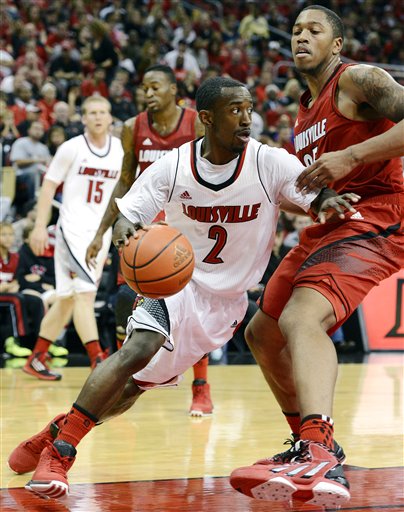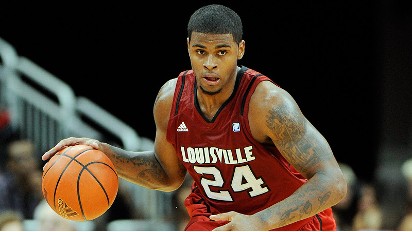Final Four Previews In-Depth: Louisville Cardinals
Posted by Chris Johnson on April 4th, 2013Chris Johnson is an RTC Columnist. He can be reached @ChrisDJohnsonn.
Final Fours are just as prone to upsets and unpredictability as any other round of the NCAA Tournament. The scouting reports on each team are more extensive, the shock factor mitigated by previous results, but the inherent variance of the games themselves breeds upsets at any level of competition. Even the best teams can be had given the perfect combination of stylistic match-up (see: Syracuse – Indiana) or hot shooting (see: Wichita State – Gonzaga). The cream of the crop is never impervious to the competitive desires of underdog opponents; thinking otherwise is ignoring three quarters of a century’s worth of college basketball history. So with that out of the way, let’s get to the truth: I’d be lying if I tried to convince you that anyone other than Louisville deserves to be treated as the odds-on favorite going into college basketball’s final weekend. The Cardinals are the best defensive team in the country, a rapidly improving offense and, following Sunday’s emotional Elite Eight victory, are playing with the well wishes of injured guard Kevin Ware as a primary motivation. Louisville has it all. Let us dig deeper and find out what makes the Cardinals such overwhelming favorites to finish the season on top of the college hoops world.
(Revisit previous entries Wichita State and Michigan)
Pre-NCAA Tournament Capsule.
We began the season rightfully touting Louisville as one of the nation’s best and most complete teams, and its early non-conference work did everything to affirm that premise. The only blemish before Big East play was a loss to Duke in the Battle 4 Atlantis Championship game (star center Gorgui Dieng was injured). The Cardinals turned in another solid Big East season, finishing tied for first place with a 14-4 record, with only one real period of concern baked in throughout – a three-game losing streak comprising a two-point home loss to Syracuse, a road-loss at a then-scorching Villanova team, and a two-point defeat at Georgetown. The Cardinals quickly recovered to dust off 10 wins in their next 11 games, the one loss a five-overtime thriller at Notre Dame, then ripped through the Big East Tournament to claim the No. 1 overall seed.
How They Got Here. Geographic priority was awarded to the Cardinals for their top-seed status, but the committee did them no favors in terms of ease of regional competition. Two Hall of Fame coaches were situated alongside Louisville in the Midwest, and the rest of the region – including trendy Final Four pick St. Louis, national player of the year candidate Doug McDermott, NCAA seeding travesty Oregon and Colorado State, the nation’s best rebounding team – was littered with potential early-round pitfalls. Louisville navigated its rocky road with aplomb, first handling North Carolina A & T, then destroying Colorado State, followed by a comfortable eight-point win over Oregon and, lastly, a punishing second-half spurt to pull away from Duke in a highly-anticipated Elite Eight clash. Aside from Duke hanging tough through the first 20 minutes, Louisville has yet to meet its equal in this field.
Final Four History.
It’s best to analyze Louisville’s Final Four history through two different lenses. Removing the Cardinals’ 1959 Final Four jaunt from the equation, UL’s trips to college basketball’s marquee event can be separated along the historical dividing lines of two legendary coaches. With Denny Crum, the Cardinals made it to six national semifinals, including two championships (1980, 1986). Nearly 20 years later, when Rick Pitino’s constant job hopping from college to the NCAA and back again gave way to a sustained tenure in Louisville, Kentucky, the Cardinals returned to the Final Four in 2005, made consecutive Elite Eight runs in 2008 and 2009, then rode the unnerving audacity and mercurial play of Russ Smith and a stout defense to another Final Four in 2012. One year later, the Cardinals are once again left standing among the last four teams playing meaningful postseason basketball.
Season High Point. Timing is everything. That’s the best way to frame Louisville’s season high point, because the Cardinals waited until the last possible moment, the Big East Tournament, to hit full gear and storm into the NCAA Tournament with 10 straight momentum-building wins furthering their case. One would presume the Cardinals have probably forgotten what it feels like to lose a basketball game. And you have to go all the way back to January 26 to identify a team beating Louisville within the 40-minute confines of regulation. Louisville hovered in neutral for much of the season, but after that exasperating five-overtime loss in South Bend, Rick Pitino’s club turbo-buttoned into overdrive, right on through the best of Big East competition in Madison Square Garden, past four NCAA Tournament teams and into Atlanta for the Final Four.
Season Low Point. The only minor stretch of concern with Louisville came during that late-January three-game losing skid, where losses to Syracuse, at Villanova and at Georgetown tempered the long established expectation that the Cardinals were not only the best team in the Big East, but one of the strongest bets to reach the penultimate stage of NCAA Tournament competition. If you really dive deep into the three losses, you see an uncharacteristically productive offensive performance from the Orange; you realize the loss at Villanova was packed into a fluky week where the Wildcats played well above their actual capabilities to knock off two top-five teams; you rationalize the Georgetown loss by respectfully tipping your cap to Otto Porter’s 17/12 double-double, and the Hoyas’ terrific home form throughout Big East play. Seeing a team lose three consecutive games makes national title predictions a risky proposition, but the Cardinals’ recovery and season work thereafter did everything to prove the their mini-slump was nothing more than an aberrant blip in an otherwise national contender-worthy season.
What’s Working.
Only one team (Oregon) has brushed with the 1.0 points per possession barrier against Louisville through four rounds of NCAA Tournament play, which is about what you’d expect with the nation’s number one defense, a unit that allowed an average of 0.82 points per trip over the entire season. Offensive improvement and consistency, particularly from Russ Smith, have driven Louisville’s tourney dominance, but their identity – as it was last season, and probably always will be under Rick Pitino – is grounded on grinding, relentless, invasive defense. The Cardinals force turnovers on 27.5 percent of opponents’ possessions, pester ball-handlers in the backcourt, frustrate seamless offensive execution, and protect the rim at all costs. They are the best defensive team in the country, and when you have premier point-prevention to fall back on, offensive struggles or cold shooting nights are less likely to get you into serious trouble. Louisville can miss a bunch of easy shots, or Smith can revert to his adverse decision making and questionable shot selection, but the Cardinals will guard no matter what, and that alone gives them a legitimate stake in any game they play.
Biggest Vulnerability. I apologize for turning this section into a converse of the previous one, but the Cardinals are an outwardly simple outfit to diagnose. Louisville always defends; they just do. The Cardinals are committed to precise full-court traps, passing-lane obstruction and avid shot contests. You didn’t need the most gruesome injury ever witnessed on a basketball court to serve notice of the Cardinals’ incessant willingness to close out shots, stay compact and do everything else that makes Pitino’s teams unflinchingly difficult to break down. The other end of the court is where things start to get a little hairy, but only in a comparative sense. Louisville is putting up a blistering 1.21 points per trip in NCAA Tournament play, which is good, but not anywhere near as trustworthy or constant as the 0.82 points per possession the Cardinals surrendered this season, best in the country and the biggest reason why Lousville remains the favorite to leave Atlanta with a national championship. Night turns to day, words read left to right, the sky is blue and Louisville guards. I can’t make those same elemental comparisons with the offensive side of operations.
Why Louisville Can Win it All.
Imagine this: a coaching career spanning nearly four decades, five collegiate institutions, two NBA jobs and a whole mess of conference milestones and Tournament achievements. Rick Pitino has the chance to add something more this weekend. If Louisville goes on to win the national championship, Pitino will become the first coach to win a title at two different collegiate institutions. And that’s not all: Pitino isn’t just on the brink of winning it all at two unrelated programs. He’s two games away from driving a stake into the hearts of UK fans with any lingering respect for the coach who brought them a national championship in 1996. Pitino is cutting across the country’s most intense basketball rivalry, and to top it all off, this could be the weekend where the Louisville coach is finally voted into the Naismith Basketball Hall of Fame. Personal fan loyalties aside, I always cast my rooting interest with the cause of witnessing something great, something historic, memorable. That’s what Pitino has a chance to accomplish this weekend, a distinguishing championship feat to accompany inclusion into college basketball’s most exclusive ring of achievement, and I’d hate to see it fall through the cracks.
Why Louisville Can’t Win it All. The constant talk of parity and “no dominant teams” and lack of starpower has boiled down to a simple and totally realistic conclusion: the only thing that can stop the best and most dominant team in the country from winning a national championship is itself. The Cardinals are too locked-in on defense, too momentously hot on offense, too emotionally charged to let this one get away from them. They have the experience of last season, a head coach on the precipice of Hall of Fame glory (potentially) and the individual playmakers – Russ Smith, Gorgui Dieng – to pull the themselves out of stagnant offensive ruts or general intensity downturns or any other performance lag that may afflict Louisville during the next two games. This is the best team in the country, plain and simple. Any failure to follow through on that rightful distinction will count as a huge disappointment. Louisville has every right to be in this spot and every right to finish strong. Besides, if we’re being completely honest, Louisville doesn’t stand a chance of competing with the one-and-done freshmen draft lottery mob making its way to Lexington next season. The window is now, and Louisville needs to carpe this diem and secure the sport’s biggest national prize while it’s still on the table.

















































